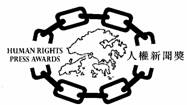A SECOD DECADE OF
HOORIG RIGHTS REPORTNG

12th ANNUAL HUMAN RIGHTS PRESS AWARDS
29 March 2008
Strong Competition For
Asia's Top Journalism Awards
There have been 193 entries for the prestigious 2007 Human Rights Press Awards, demonstrating the importance put on rights reporting in Hong Kong and the region by local journalists and foreign correspondents.
This year’s competition is the first since the Human Rights Press Awards shifted to a calendar-year basis. To make the change, last year’s competition had a one-off eligibility period of 20 months, with a record 338 entries. The organizers find this year’s total to be in line with the average annual submissions over the previous decade.
The winners were announced at luncheon ceremony on 29 March 2008 at the Foreign Correspondents’ Club. The Awards are co-sponsored by Amnesty International (Hong Kong), the Hong Kong Journalists Association and the Foreign Correspondents’ Club, Hong Kong.
The independent judging panels of journalists, professionals, academics and human rights experts awarded eight Prizes and 15 Merit Certificates in English-language categories, two Prizes and five Merit Certificates in Chinese-language categories, and two Prizes and seven Merit Certificates in Photography. (A full list of winners is available here.)
Businessman and human rights strategist John Kamm, founder of the Duihua Foundation, was the guest speaker at the Awards ceremony held at the FCC. Mr. Kamm spoke on "China's June 4 Prisoners: The Road to Justice." He addressed the role played by Chinese journalists in letting the world know the names of hundreds of people detained in the so-called “counter-revolutionary riots” of 1989 that occurred in Beijing and at least 300 mainland cities.
The FCC’s president, Chris Slaughter, said the annual Awards acknowledge the important role and responsibility of the media in reporting on human right issues.
“They also recognize the difficulties inherent in reporting, publishing or broadcasting such stories,” he said, “and they honor those journalists who are not only committed to covering these topics, but whose reports stand out as examples of excellent journalism.”
Amnesty International Hong Kong’s director, Milabel Amar, said a free news media was the cornerstone of development in a democratic society, but heightened fears of terrorism and concerns about national security were too often being abused as a justification for increasing repression.
“That is why the Amnesty International Hong Kong Section, along with the other organizers of the Human Rights Press Awards, lend our support to and campaign for the protection of those who express their opinions openly and freely around the world, particularly those who speak out in defense of human rights,” Ms Amar said.
Fan Ho-tsai, chairperson of the Hong Kong Journalists Association, said her heart felt heavy when reading the entries: “It is said that we are living in a civil society, but violations of human rights are happening all the time. I hope that by disclosing issues of inequity and injustice, these reports will encourage wide discussion and arouse the concern of governments to improve the overall human rights situation.”
For the first time, entrants were required to indicate the specific sections of the Universal Declaration of Human Rights applicable to their submission, in response to the judges’ view that many applicants were not differentiating between human-interest stories and human rights stories. Some judges queried whether the new requirement might have dissuaded possible applicants, but the English-language panel felt that this year’s submissions were much more focused.
Francis Moriarty, Chairman of the FCC Press Freedom Committee, reminded the overflow audience that Ching Cheong, a Hong Kong reporter for the Singapore Straits Times, had been imprisoned in China at the time of last year’s Awards ceremony, but an international campaign on Mr. Ching’s behalf had since helped to obtain his release. Mr. Moriarty thanked all those who had supported the campaign. He also lauded the efforts of the reporters and photographers who have been trying to bring the facts of the Tibet uprising to the rest of the world.
Previous speakers at the Awards luncheon have included Cardinal Joseph Zen, Bishop of Hong Kong; dissident Chinese journalist, Gao Yu; Malaysian human rights activist, Irene Fernandez; former chairperson of Hong Kong’s Equal Opportunities Commission, Anna Wu, and Asia program consultant for the Committee to Protect Journalists (CPJ), Lin Neumann.